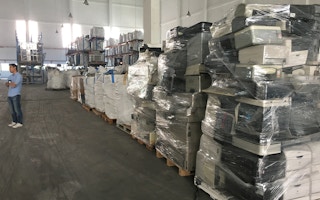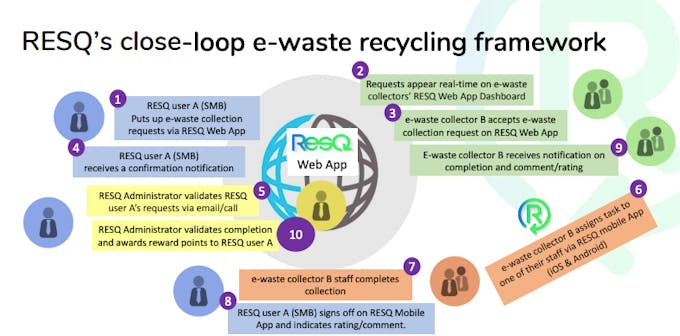The key to solving Singapore’s growing e-waste problem lies not only with consumers and big corporates, but the country’s small-to-medium sized entreprises (SMEs), which dominate the local business sector.
To continue reading, subscribe to Eco‑Business.
There's something for everyone. We offer a range of subscription plans.
- Access our stories and receive our Insights Weekly newsletter with the free EB Member plan.
- Unlock unlimited access to our content and archive with EB Circle.
- Publish your content with EB Premium.
SMEs generate a lot of e-waste—there is no official data that breaks down e-waste by sector—but most of these used computers, printers, photocopiers and telephones are gathering dust in offices, as companies either don’t know how or where to dispose of it, don’t want to pay for it to be collected, or are worried about data security.
However, a new app could give small businesses a way to dispose of e-waste easily, securely and responsibly.
The invention of local advertising agency Salt Creatives, the RESQ app connects companies with certified e-waste recyclers who will collect and process used electronics for free.
Recyclers are alerted to e-waste collection requests from companies via the app, and pay a monthly subscription fee to use the service.
Companies pay only for e-waste collection below a minimum weight and for data destruction services. They are rewarded with shopping vouchers if they persuade other companies to use the app.
RESQ is to be piloted later this month, and is slated for full launch in May or June, depending on how well the trial goes. One company already on board is Singapore-headquartered multinational recycling firm Virogreen.
The missing link
Salt Creatives managing director Low Cheh Chan said he was inspired to do something about Singapore’s e-waste problem having worked with former client HP, a large business that runs its own recycling programme in Singapore in collaboration with recycler Tes-Amm.
As the boss of an SME himself, Low said that SMEs in Singapore are a missing link in the e-waste problem. While big corporates have deals with recyclers to manage their e-waste, many smaller businesses leave used electronics in their offices.
Bulky items such as printers and photocopiers are too big to put in the e-waste collection bins put out for consumers by corporate recycling schemes from the likes of Singtel, StarHub, and Dell, and so e-waste tends to be dumped in with general waste and ends up being incinerated, Low told Eco-Business.
Singapore recycles 6 per cent of the 60,000 tonnes of e-waste produced annually—the rest is incinerated.
There is no existing legislation on e-waste in Singapore, Asia’s second largest generator of e-waste per person after Hong Kong, although an extended producer responsibility (EPR) scheme for makers and importers of electronic goods is to be introduced in 2021.
Calls for e-waste to be better managed have grown louder this year as Southeast Asian nations have become the preferred destination for the developed world’s trash after China closed its doors to waste imports at the start of last year.
Recycling plants popping up in informal settings across the region are exposing local communities and the environment to harmful pollutants in e-waste such as lead, mercury and cadmium.
Low said if the RESQ app takes off, he planned to trial it elsewhere in the region, and include other categories of waste for recycling.











